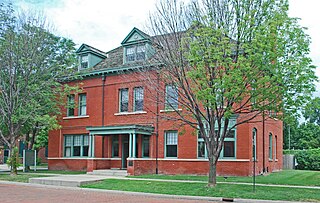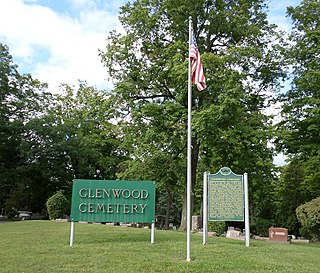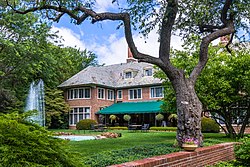
Walter Percy Chrysler was an American industrial pioneer in the automotive industry, American automotive industry executive and the founder and namesake of American Chrysler Corporation.

Flint is the largest city and seat of Genesee County, Michigan, United States. Located along the Flint River, 66 miles (106 km) northwest of Detroit, it is a principal city within the region known as Mid Michigan. At the 2020 census, Flint had a population of 81,252, making it the twelfth-most populous city in Michigan. The Flint metropolitan area is located entirely within Genesee County. It is the fourth-largest metropolitan area in Michigan with a population of 406,892 in 2020. The city was incorporated in 1855.

Charles Williams Nash was an American automobile entrepreneur who served as an executive in the automotive industry. He played a significant role in building up General Motors as its fifth president. In 1916, he bought Thomas B. Jeffery Company, makers of the popular Rambler automobile, and renamed it Nash Motors. The resulting firm played an independent role in an automobile industry increasingly dominated by the Big Three: General Motors, Ford, and Chrysler.

William Crapo Durant was a leading pioneer of the United States automobile industry, founder of General Motors and co-founder of Chevrolet. He created a system in which a company held multiple marques – each seemingly independent, with different automobile lines – bound under a unified corporate holding company. Durant founded General Motors and co-founded Chevrolet with Louis Chevrolet. He also founded Frigidaire.
Stewart Rawlings Mott was an American philanthropist who founded the Stewart R. Mott Foundation. He was the son of Charles Stewart Mott and appeared on Nixon's Enemies List for his support of liberal causes.

Charles Stewart Mott was an American industrialist and businessman, philanthropist, a co-owner of General Motors, and the 50th and 55th mayor of Flint, Michigan.

Durant Motors Inc. was established in 1921 by former General Motors CEO William "Billy" Durant following his termination by the GM board of directors and the New York bankers who financed GM.
The Charles Stewart Mott Foundation is a private foundation founded in 1926 by Charles Stewart Mott of Flint, Michigan. Mott was a leading industrialist in Flint through his association with General Motors.

The Durant-Dort Carriage Company Office is a National Historic Landmark owned by General Motors. A late 19th-century office building located at 316 West Water Street in Flint, Michigan, it was built and occupied by GM's parent, Durant-Dort, followed by Dort Motor Car Company, until 1924.

U.S. Sugar Corporation is a privately owned agricultural business based in Clewiston, Florida. The company farms over 230,000 acres of land in the counties of Hendry, Glades, Martin, and Palm Beach. It is the largest producer of sugarcane in the United States by volume, producing over 700,000 tonnes per year. The company is also a large producer of refined sugar, sweet corn and oranges.
ACDelco is an American automotive parts brand owned by General Motors (GM). Factory parts for vehicles manufactured by GM are consolidated under the ACDelco brand, which also offers aftermarket parts for non-GM vehicles. Over its long history it has been known by various names such as United Motors Corporation, United Motors Service, and United Delco. The brand "ACDelco" should not be confused with GM's former AC Delco Systems, formed in 1994 from the merger of AC Rochester Division and Delco Remy Division. In 1995 Delphi Automotive Systems absorbed AC Delco Systems.

Durant-Dort Carriage Company was a manufacturer of horse-drawn vehicles in Flint, Michigan. Founded in 1886, by 1900 it was the largest carriage manufacturer in the country.

The Elks Lodge Building in Flint, Michigan, also known as Old Elks Building, was built in 1913. It was listed on the National Register of Historic Places in 1978.

Josiah Dallas Dort was an American engineer and automobile pioneer of the United States automobile industry. He was born in Inkster, Michigan on February 27, 1861. His father was a well-to-do country squire and merchant, well connected politically, who died in 1871 when Josiah was 10. Dort left school at age 15 to help his mother in business and to work at a crockery firm. He moved to Flint, Michigan in 1879. In 1881, he began working at a Flint hardware store, and within a few years opened his own hardware store.
The W.F. Stewart Company was an American carriage body and automotive body manufacturer founded in 1881 by William Francis Stewart and based in Flint, Michigan. The company specialized in the design and manufacture of wooden carriage bodies for horse-drawn transport and later automotive bodies. The company also briefly produced light aircraft, but went out of business in the Great Depression.
Harry Hoxie Bassett was an American automotive industry executive and president of Buick Motor Car Company, division of General Motors from 1920 through 1926.

The William A. Paterson Factory Complex was a factory located at 126 East 3rd Street in Flint, Michigan. It was listed on the National Register of Historic Places in 1984. The building was demolished in 1996.

Glenwood Cemetery is a cemetery located at 2500 W Court Street in Flint, Michigan. It was listed on the National Register of Historic Places in 2010.

The Charles Stewart Mott Foundation Building is a 16-story office high-rise building in downtown Flint, Michigan. It is the tallest building in the city. Designed by Wirt C. Rowland in 1928 and opened in 1930, it was built as the Union Industrial Bank Building to serve as the headquarters for Union Industrial Bank. Rowland was considered innovative for his use of two materials in the building's construction: Nirosta for decorative purposes in the public spaces and aluminum for its storefronts and window frames.

Durant-Dort Factory One is a former cotton textile, carriage, and automobile factory in Flint, Michigan, that is now an archive and a center for research, meetings, and the community. The building was constructed in 1880 as a cotton textile factory. It produced carriages for the Durant-Dort Carriage Company from 1886 to 1917 and then produced cars for the Dort Motor Car Company from 1917 to 1924. It is often considered the birthplace of General Motors (GM).

















